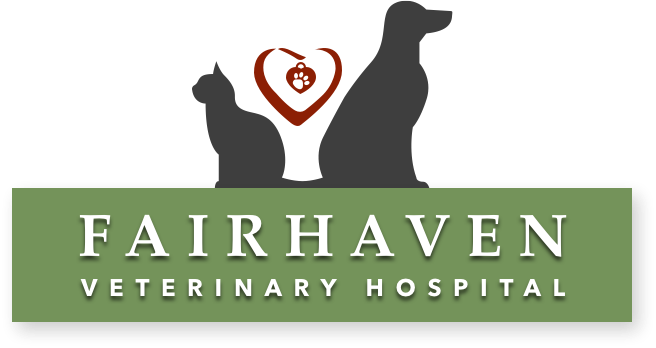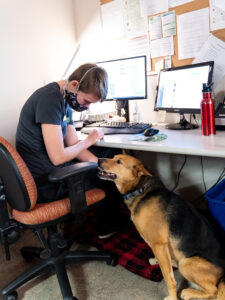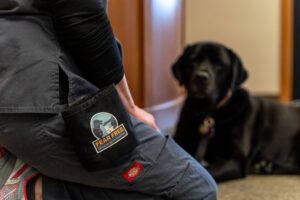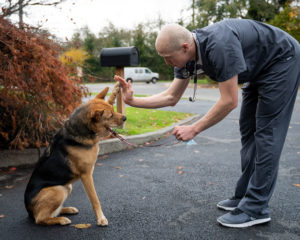Fairhaven Veterinary Hospital is a Fear Free Certified Practice!
As a Fear Free Certified Veterinary Practice, our goal is to help you and your pet receive compassionate, quality, individualized, care. Not just for today, but for life. This means that we include behavioral health in our care approach as fear, stress and anxiety can all negatively impact medical outcomes, tarnish quality of life, and create barriers to receiving adequate veterinary care in the future. Every member of our staff has undergone extensive training, starting with Fear Free certification, and continuing education in behavior each year. We are so excited to partner with our patient’s guardians to help them better understand and care for their pets throughout their lives together.
What to Expect?
When You Make the Appointment
- If your pet is a new patient, you will be asked questions about your pet’s preferences and past veterinary experiences. Established patient’s records will be reviewed to ensure we set your pet up for success through strategic timing, medication needs, treat preparation and more!
- The customer service team will email you a questionnaire to better understand your pet’s needs and plan for their visit.
- You will be provided with resources to help you provide a Fear Free experience on your way to the appointment.
- It will be recommended that you bring your pet in a little hungry and to bring his/her favorite treats, if medically appropriate.
- If your pet has a history of fear, stress, or anxiety during veterinary care, we may discuss using calming and anxiety reducing medications prior to the appointment, to reduce stress before arrival.
When You Arrive
- You will be asked to text us that you have arrived and wait outside or in your car with your pet until the exam room is ready. This ensures that your pet does not have the experience of a stressful or crowded lobby, meet other dogs or cats who might be stressed, ill or painful, and can be taken straight to an exam room when they enter the building.
- If you are bringing a feline patient, you will be offered a towel to cover your cat’s carrier, to act as a visual block to reduce stress, and which will have been treated with “happy pheromones” to help your pet relax.
During the Visit
- Your pet will be examined where they are most comfortable (e.g. on the floor, a bench or chair, the exam table, or in a lap) and will be provided with a nonslip surface (e.g., rug or yoga mat).
- Your pet will be offered yummy treats during the whole visit, if medically appropriate. These are used both for distraction, and to condition positive associations.
- It should be quiet. Relaxing music or white noise machines may be playing softly, but you will never hear overhead pages or ringing phones.
- Your veterinary team will not just communicate their physical and medical findings, but will also discuss behavior that is displayed throughout the visit and its meaning.
- No team member will ever scruff your cat or pin your dog to force them through any treatment. Aversive handling techniques may seem to “get the job done” in the moment but have significant fallout and may create a pet who cannot tolerate any handling in the vet office without extreme fear or even aggression. All team members have taken oaths to never perform this type of handling.
- If your pet is especially fearful during your visit, your team will pause and work with you to create a new plan- perhaps by administering sedation that day if your pet’s medical needs are immediate and necessary, by rescheduling with the additional preparation of calming medications or supplements or delaying further care until after working with a positive reinforcement trainer to build handling comfort and confidence. These are just a few possible solutions. Your team will always consider your individual pet and work with you to make a plan which supports lifelong care.
Before You Leave
- The veterinary team members will note your pet’s emotional response to the visit and what treats and techniques worked best to prevent or reduce any fear, anxiety, and stress in your pet.
- If needed, the veterinary team will make suggestions to help make future visits even more enjoyable for your pet. This might include providing resources for cooperative care training, using calming medications or supplements to decrease fear and/or anxiety or even medication to alleviate car sickness.




